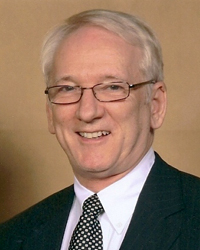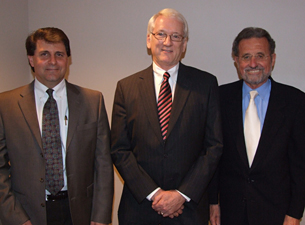Feature Story
Health Center Today, May 5, 2011
Informatics Maven Sees Challenge, Opportunity at UConn
By Chris DeFrancesco

Dr. Ted Shortliffe of the American Medical Informatics Association was the keynote speaker for this spring’s CICATS Biomedical Informatics Seminar Series.
Photo courtesy of the University of Texas
The field of biomedical informatics, seen as an increasingly important component of translational research, is gaining momentum at UConn, according to a national expert who recently visited both the Health Center and the Storrs campus.
Informatics refers to information and knowledge management to support problem solving and optimal decision making.
“It builds upon the observation that there are few areas of human endeavor that are more dependent upon information, knowledge, and their management than the promotion of health, the practice of medicine and the management of patients,” says Dr. Ted Shortliffe, president and CEO of the American Medical Informatics Association, Bethesda, Md.
Shortliffe gave talks in both Storrs and Farmington as part of the Connecticut Institute for Clinical and Translational Science (CICATS) Biomedical Informatics Seminar Series.
“I think the University of Connecticut has moved into this field somewhat later than some other schools, and like many institutions it became particularly interested in informatics when it realized that the field is now viewed as intrinsic to modern clinical and translational research,” Shortliffe says, referring specifically to UConn’s pursuit of a National Institutes of Health Clinical and Translational Science Award. “You cannot get CTSA grants without a commitment to biomedical informatics. That reality has encouraged many institutions to begin to pay serious attention to the discipline. Here at Connecticut I think there have been some very good people interested in this field for a long time, but institution-wide momentum is just beginning.”
Shortliffe, who also is a professor of biomedical informatics at the University of Texas Health Sciences Center at Houston, serves on CTSA external advisory committees for several institutions.
“Informatics is so interdisciplinary that it is inherently integrative,” Shortliffe says. “Institutions that have taken informatics seriously and promoted it and nurtured it have often found that the resulting academic unit has become a kind of glue that begins to have folks from different parts of the university talking to one another and collaborating in ways that they had not done before.”

Dr. Thomas Agresta, Department of Family Medicine director of biomedical informatics (left), and Dr. William Knaus, CICATS director of biomedical informatics (right), brought Dr. Ted Shortliffe, informatics expert (center), to Connecticut to speak at seminars in Farmington and Storrs.
Photo by Chris DeFrancesco
The integrative nature of the field is one that can be challenged by the geographical separation of the Health Center from the Storrs campus, but Shortliffe notes that the statewide nature of the school and its relationships also provide an opportunity for UConn.
“Connecticut is a relatively small state,” he says. “Therefore, there are opportunities for a CTSA and its informatics components to be integrative across institutions in a large regional or statewide fashion. This opportunity is relatively unique among major schools that have been pursuing community outreach as part of a clinical and translational research program. The potential for statewide reach in Connecticut has been noted by others and it is perhaps a way in which UConn can really distinguish itself in promoting informatics and translational science, finding its own niche."
Shortliffe’s presentation from April 29 at the UConn Health Center, “Biomedical Informatics: The Evolution of the Science and Its Application,” is available through the Health Center’s Mediasite portal.


